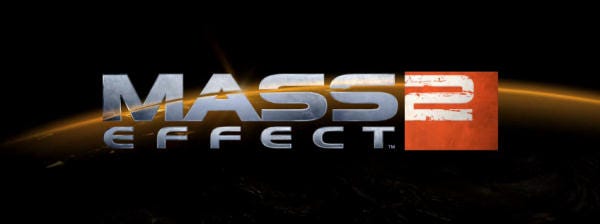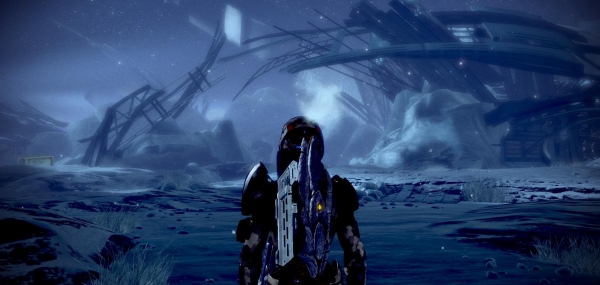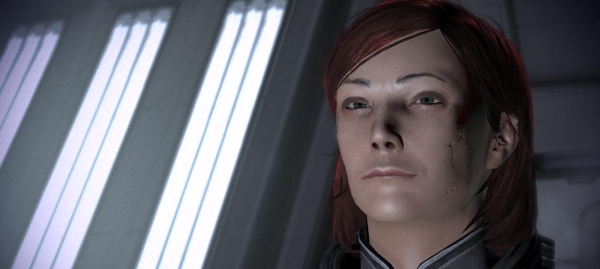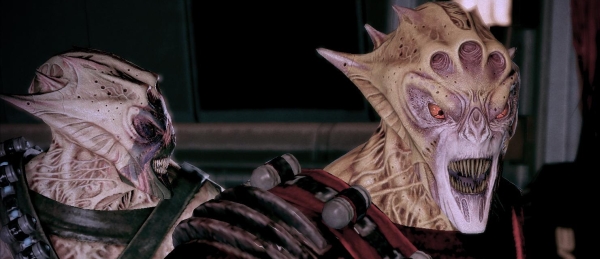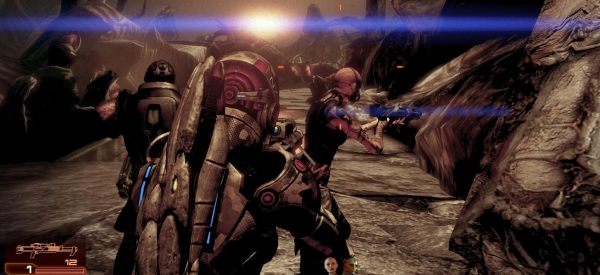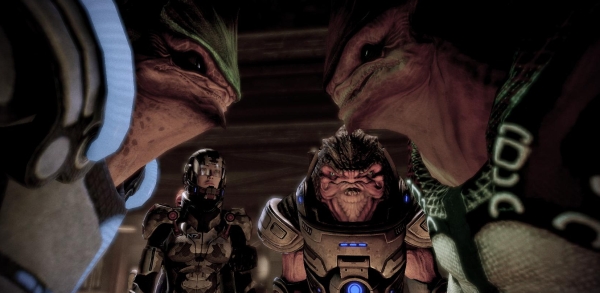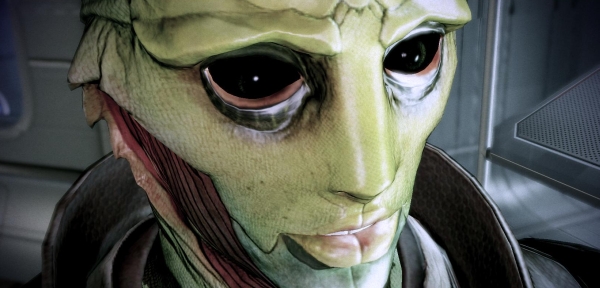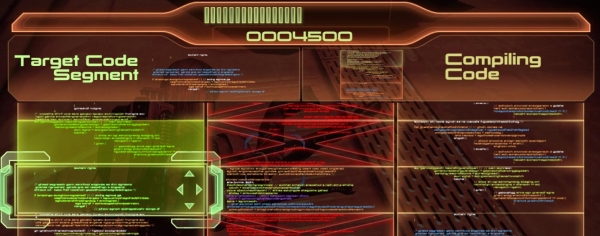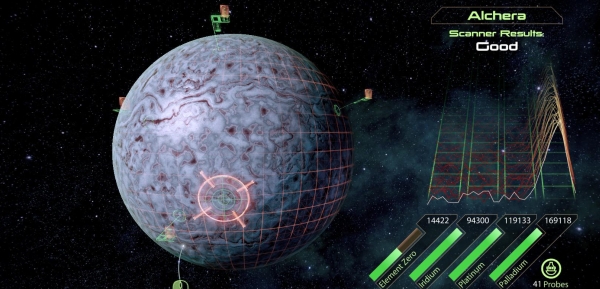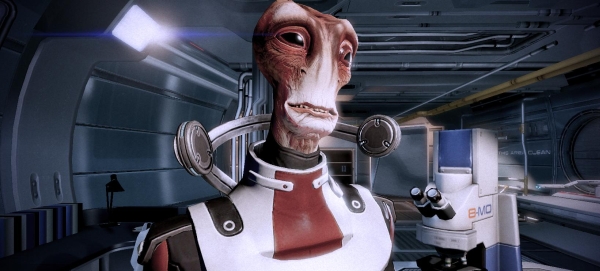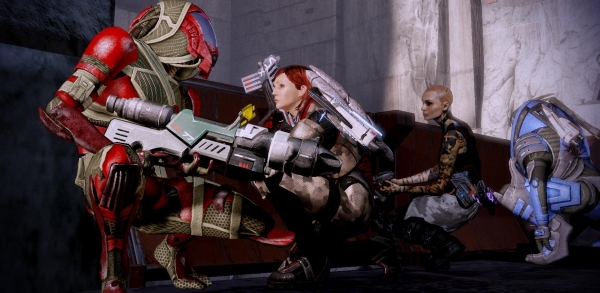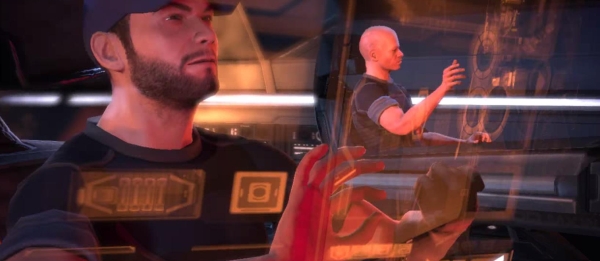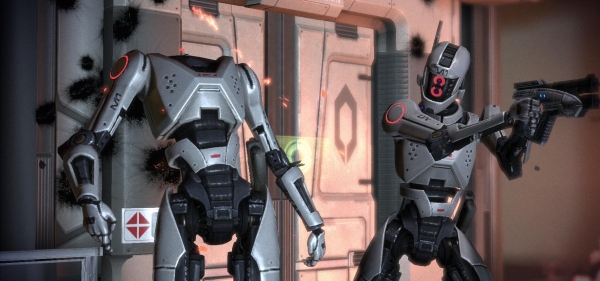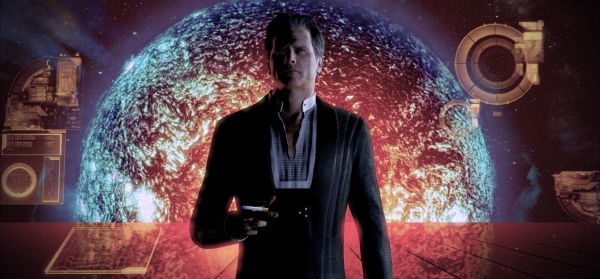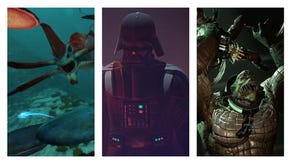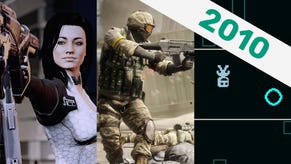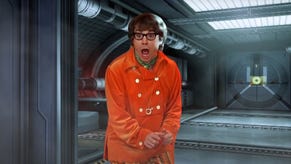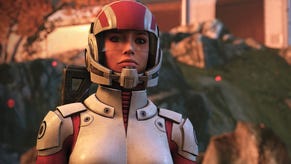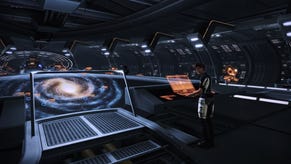Wot I Think: Mass Effect 2
First of all, to explain why this review is so late. We’d hoped for code well in advance, but sadly it wasn't sent to us until the release day. I have since played the game to absolute completion. Thus it is only proper to tell you Wot I Think. (You can safely assume this review contains enormous Mass Effect 1 spoilers, but I will not spoil ME2.)
I feel like I should declare my interests. I had a savegame. My original save of my original Shepard from the original Mass Effect. A Shepard with whom I’d bonded, and a Shepard who had bonded with the galaxy. I cannot imagine the frustration of having lost a save, and discovering that BioWare recklessly backed down on the claims to let you pick the events as you remembered them. To have found that the game had decided I’d destroyed the Council, or killed Wrex, would infuriate me beyond belief. But this didn’t happen to me, and it seemed important I make that clear.
Mass Effect saw Shepard, whether male or female, saving the galaxy from the threat of the Reapers, via the tricks of action RPG. Sovereign, a ship-sized Reaper AI, intended to wipe out the alien races occupying the Citadel. A stop was put to that. But despite this rather epic plot, the real story of the game was humanity’s emergence into the wider cosmos. It was a game about being the youngest race, the new kid at school, and the confusion of humility and humiliation this imposed upon one of space’s most arrogant species.
This sequel reverses the theme. While its main story is about humanity, and the disappearance of entire human colonies - millions being wiped out while the Council authorities do nothing - the real plot here is made of the smaller stories of individuals. And the action is much more, well, actiony. But more on that later.
So there was that moment. Booting the game, having imported the save across, and seeing my Shepard, the One True Shepard, there on the screen. An Infiltrator, entirely Paragon (Mass Effect’s morality is divided between goodly Paragons and naughty Renegades), who had saved the Council and Wrex but allowed Captain Boringpants Alenko to die. And I beamed a huge smile. Shepard! We’re off again.
However, those scared of commitment are given plenty of options. Due to plot events in the opening scenes of the game (and even they I think would be too much detail to reveal, beyond that it contains Shepard’s apparent death) it is possible to change the appearance of your Shepard, should you wish him/her to have aged, changed hairstyle, or become a strange ugly old crone. You can also change specialisms, should you maybe wish to switch from Tech to Biotic, perhaps try out the Adept class, or have a go at being an Engineer. Oddly, later you’re still given some dialogue choices about events from the first game – a person’s fate can be decided by what you remember, rather than what your save game says. Which is very odd.
Once past this extreme muddle at the start, the experiment begins to work. In the attempt to cater for every contingency, they’ve created this blur of options that rather spoils the fluid idea of just importing a character and carrying on. But get through that and it really does feel like the galaxy you once stalked. You will meet many people you previously encountered, even from the most minor side quests. Everyone wants to say hi, make a comment about how they thought you were dead, chat to the hero. Then more significant characters will reflect key decisions you made.
In fact, some of these are extremely significant to both the galaxy and the plot. Shepard is recruited by a black ops human organisation called Cerberus, rogue from the military Alliance, funded and controlled by the mysterious Illusive Man. They intend to find the source of the human disappearances, believed to be at the hands of the Collectors, and ancient race thought to be mythological by most. But Cerberus is neither liked nor trusted, and to defy the Alliance and work for them is to ostracise yourself. This is also to rebel against the Citadel Council, and indeed the Spectre organisation you joined in the first game. Unless of course there is no Council thanks to your actions. The story of the Krogans is equally defined by the actions you previously took, while relationships established previously can carry over here. I was looking forward to seeing Liara.
The darker tone so frequently promised over the last year of promotions is absolutely true. Mass Effect was a game about potential. Humans were not trusted, not respected, and Shepard demonstrated that they at least deserved to be heard. But Mass Effect 2 is a game about death. It begins in brutal death, and rarely offers hope beyond that.
This extends to your companions. Shepard’s primary goal is to gather together a team of the most adept and dangerous fighters and tacticians in the galaxy, who will then together face the menace waiting for them at the other side of the Omega 4 mass relay. Given dossiers of potential recruits by the controller of Cerberus, the Illusive Man (voiced wonderfully by President Barlett himself, Martin Sheen), you set about convincing them to join your cause.
As is apparently a tradition at BioWare, only broken by Dragon Age, it’s crucial to begin with two really boring characters you’ll never want to bother with again once you’ve recruited some others. This time there’s Jacob Taylor, a human biotic soldier who is… oh, I don’t know. It’s hard to imagine how they could have made him less entertaining. He’s even overtly surly toward you from the start, meaning he refuses to chat. So, well, bye then. The other is Miranda Lawson, biogenetically engineered to be the perfect human. Perfect in all ways other than having anything interesting to say. She’s voiced by the completely lovely Yvonne Strahovski (Chuck’s Agent Walker), with her face modelled on the actress, but sadly she’s just not that engaging.
So fortunately you can pick up at least nine others (I found eleven companions in total, but there’s suspicious space left on the selection screen for more). And could I encourage all to make sure that Mordin is one of the first they pick? I’d hate to influence someone else’s decisions in a game that leaves itself quite so open, but missing out on Mordin for much of the game would be a tragedy. But we’ll get back to him.
I really should have mentioned the combat by now, what with it making up about half the game. Whatever your memories (or indeed what you might have heard) about the original game’s slightly flaky fights, forget about all that. This nails it. While the difficulty is, in contrast to Dragon Age, set a little low, this is splendid third-person action stuff, but imbued with and embellished by some really smart RPG skills.
A lot has been stripped down. Gone are inventories, ammo types, armour selection, and then all the confusion of augmentations added to these. Now the battlefield is focused on the action, using an absolutely fantastic cover system to orchestrate thrilling fights. Holding down Space to sprint, and aiming toward an object, will see Shepard slide magnificently into cover. Then you can fight in real-time, your two selected buddies making smart use of their abilities and weapons, and the cover (but always giving up a key spot for you should you want it). Hitting Shift pauses the action and opens up a very simple menu system from which you select a special ability from anyone’s collection. This also lets you change weapons, and heal fallen party members (again, super simple, just click the button and so long as you’re carrying medi-gel, they’ll get back up and carry on). It’s possible to issue instructions to your companions, Q and E creating markers on the ground ordering them to that position. But mostly they’re so efficient you’ll not need to worry about that. Instead you focus on firing off some awesome biotic or tech powers, perhaps pulling an enemy out from his cover and into the air, so you can then fill him with bullety goodness.
As an Infiltrator I had access to sniper rifles, which were just wonderful. As my abilities improved (again, a very simple skill selection system whenever you level up), using a sniper rifle gave me a few moments of slow-motion time in which I could fire off three or four shots into three or four foreheads, making me feel like the greatest shot in the universe. This feeling emboldened by a buddy commenting, “Great shooting!” only when it actually was some great shooting.
Improvements are made to weapons and armour through research back on the Normandy. Research information can be found during missions through hacking, or learned from companions, and then purchased in exchange for raw materials gathered through mining planets. Which brings us to hacking and mining, two areas where Mass Effect 2 perhaps falls a little short. Where by “little” I in fact mean, “a stretching chasm of horror”.
There are two hacking “minigames”. Both are essentially picture pairs. One requires you to match five different symbols with their partners, by hovering the mouse over blue blobs to see which are which. Then you click on both of them. So it is, in fact, like picture pairs without the challenge of having to guess. The other is even simpler, where you must click on a block of coloured text that matches the block of coloured text at the top of the screen. You do this three times, without accidentally moving into one of the red rectangles, and you win. Neither requires more than a vestigial brain stem to complete – in fact, to take more than half the available time would be embarrassing. They instead serve to be enormous irritants, when the game might just as well have let you get the info with a single mouse click.
Mining is far more time consuming. There’s five different materials needed for purchasing upgrades, and you’ll need them for not only weapons and armour, but also making significant improvements to the Normandy for the final stages of the game. To get these you fly about the stunningly huge cosmos, looking for unexplored planets in the dozens and dozens of solar systems, and then scanning them. This involves laboriously sweeping a clumsy cursor across every millimetre of a sphere, waiting until a meter on the right spikes, then firing a probe to retrieve that ore. Each planet contains approximate 15 to 30 spots to find before it’s depleted, with very many needing to be mined to buy the available upgrades. I found the only way to tolerate this was to put on a TV show on my other screen to prevent madness. Although the “PEEOONNNG!” noise made by launching a probe is nice.
So you can no longer land on most of these planets to perform your searches. Instead very, very occasionally your probing will reveal an anomaly, which can then be investigated. These lead to unique, somewhat perfunctory mini-quests, but with far more imagination than the identikit warehouses of the first game. But also gone is the vehicle for exploring surfaces (despite the controls still appearing in the options – later DLC it seems).
To get the other two gripes out of the way: The indication that something can be interacted with appears in the form of some extremely crude text at the top of the screen. (Crude in the sense of being ugly, it’s not swearing at you – not here, at least.) It looks so tacky, like some placeholder they forgot to fix before release. And there’s a couple of frustrating bugs. When holding a sniper rifle, for some reason using other abilities (like AI hacking) will cause you to become zoomed in, and unable to zoom out for a while. Worse is Shepard’s odd habit of accidentally climbing on surfaces then not being able to get down. This became completely farcical at one point when I was stuck on a table, and then had my two companions float up to join me. It seems mysterious that this bug wasn’t spotted pre-release. And that’s enough moaning.
Because by God’s beard, this game is brilliant. The combat is brilliant, the missions are brilliant, the worlds you explore are brilliant, and most of all, the characters are so very brilliant.
You’ll have a favourite. For most it’s Mordin Solus. A Salarian geneticist, his fast-paced chatter is wonderfully written. He analyses, constantly, including everything he’s just said. And then you learn about who he is, what he’s done, and things get interesting. BioWare have long had a special skill for creating morally interesting situations, but never with the sophistication of Mordin’s back-story. This isn’t a couple walking up to you in the street and asking you to decide if they should have an abortion (and I should mention here that there appears to be a joke in the game directly referencing this piece I wrote about such moments, and it made me laugh long and hard). This is about a complicated, nuanced and extremely well argued debate. Oh, and he sings a song.
But I can’t share my favourite character, as it’s another big spoiler. So instead I shall talk about my second favourite, Jack. She’s the one from that ghastly trailer, all swears and attitude. And she is all swears and attitude, but executed brilliantly. I was nice to her when I first met her, as is my Paragon way. “Shit,” she replied, “You sound like a pussy.” She’s bad-ass, she’s furiously angry, she’s shaven-headed and covered in aggressive tattoos. In so many ways that might make her so many game characters. But she’s unique. She’s a phenomenally, devastatingly broken person. The tragedy of her life, the reasons she’s the person she is now, are explored in traumatic detail. And even they are nuanced beyond even her own expectations.
Jack’s past, and indeed elements of the lives of all eleven companions, are explored in ‘loyalty missions’. So you have the initial mission to recruit them, then as you get to know each of them they will ask you to help with a particular situation. Once completed it opens up new abilities for them, and rather ridiculously, an alternative costume. Again here the bleak tones of Mass Effect 2 emit their gloom. Whether you secure the loyalty of a companion or not often comes down not to whether you’re capable of successfully completing a mission (although it is possible to fail, and the game carries on), but more to do with whether you find the goal morally acceptable. Many will challenge you on this. And even when they don’t, the outcomes can be… well, this isn’t a game about puppies and flowers.
Among the morbid tones are some real moments of fantastic humour. In fact, I haven’t laughed out loud at a game this often since Time Gentlemen, Please. One conversation in particular, toward the end, was so beautifully written and performed that it had me in stitches, awkward and cute and silly and bursting with love. There’s also some lovely self mockery from BioWare. Along with the apparent reference to objections regarding strangers asking Shepard to solve their personal problems (something that does occasionally still happen, but each time with a rational reason behind it), there’s so many wonderful conversations to overhear as you walk around. A favourite was a couple in the souvenir shop in the Citadel, arguing over the idiotic gifts available. Goodness knows how many of these I missed when rushing past crowds on an important errand.
The desire to escape cliché extends further. The self-awareness on BioWare’s part seems to have led them to cleverly defy expectations. A good illustration appears aboard a prison ship. It’s a place for some of the worst criminals in the galaxy, but also home to some terrible brutality. At one point you walk past a caged prisoner who calls you over. He’s a sweet guy, friendly, chatty. He helps you. And so here we go, it’s the wrongly imprisoned/ambiguously guilty man we can help to set free if we see his side of things. (See every BioWare game ever, including Dragon Age.) But then you can ask him why he’s in the prison. Ah, he explains, he murdered nineteen, maybe twenty people. And blew up that colony. Oh.
“Good deeds are like pissing yourself in dark pants,” explains Jacob in a strange moment of not being rubbish. “There’s a warm feeling, but no one notices.” That’s a great line. And it’s one of hundreds. Of which a considerable number belong to the interactions between your pilot, Joker, and the Normandy’s new AI, EDI.
Also more interesting is the Paragon/Renegade divide. While Dragon Age usefully got rid of a good/evil rating altogether, Mass Effect 2 evolves it to be something much more appealing. It doesn’t win over the approval of your companions. The missions aren’t really appropriate for their shock or delight at your actions. Most of the people you’re with are so morally ambiguous that they’d be hard-pushed to be bothered whether you murdered some babies, or arranged for them to be adopted. It’s about opening up conversation options, and thus resolving situations in different ways.
The other purpose is the interruptions. During some scenes you’ll see either the Renegade or Paragon icon appear on screen. Hit the appropriate mouse button at that point and Shepard will step in to do something either nice or nasty to change events. Don’t click and things will carry on despite you. This can often save lives, or quickly end them. What’s most interesting here is that choosing the option that goes against your normal nature doesn’t feel like a betrayal of who you are. It’s not like in KotOR, where you’ve been spreading happiness across the whole of the universe, and then suddenly announce to a stranger that you’re going to stamp on her child’s face to see if it sounds funny. It’s about assessing a situation and wondering if a less than holy response might be more appropriate here. (The only problem with this is my habit of playing DS games during conversations meant I kept missing the appearing options.)
The balance between story and action has never been so deftly handled. It’s not compromised action, a weedy RPG version that’s really only dice rolling. It’s hands-on, real-time, well designed combat. And it’s not a story draped over the action. It’s an intricate, epic, involved and emotional series of adventures and meaningful relationships.
Where the main story does fall down slightly is on reflection. Finish the game and look back at what the main thread was about, and it’s a fairly hollow thing. Because this is a game about smaller, intertwining plots, personal stories about those who keep you company. It’s the middle section of a trilogy, and as such its plot cannot be complete, nor revel in introducing a new world. The solution of involving you in the complex lives of your shipmates works magnificently. And the finale makes clever use of taking advantage of all the efforts you’ve made. You need not have recruited everyone to reach this point, so any extra work you’ve put in feels rewarded.
It’s a stunning thing. There are so many stories I’m left wanting to tell. So many situations that merit discussion afterward. So many characters I’d love to talk about in more detail. It’s been agony not to give anything away. But you should go find out for yourself. If you’ve not played the original Mass Effect, don’t be put off by talk of the clumsy combat. It’s definitely clumsy, and I’m quite certain if you played the sequel first you’d not put up with it. So go play the original, then come to this. It’s worth it. If there’s anyone who did play the first game and for some reason hasn’t yet picked this up, for goodness sakes get on with it.
